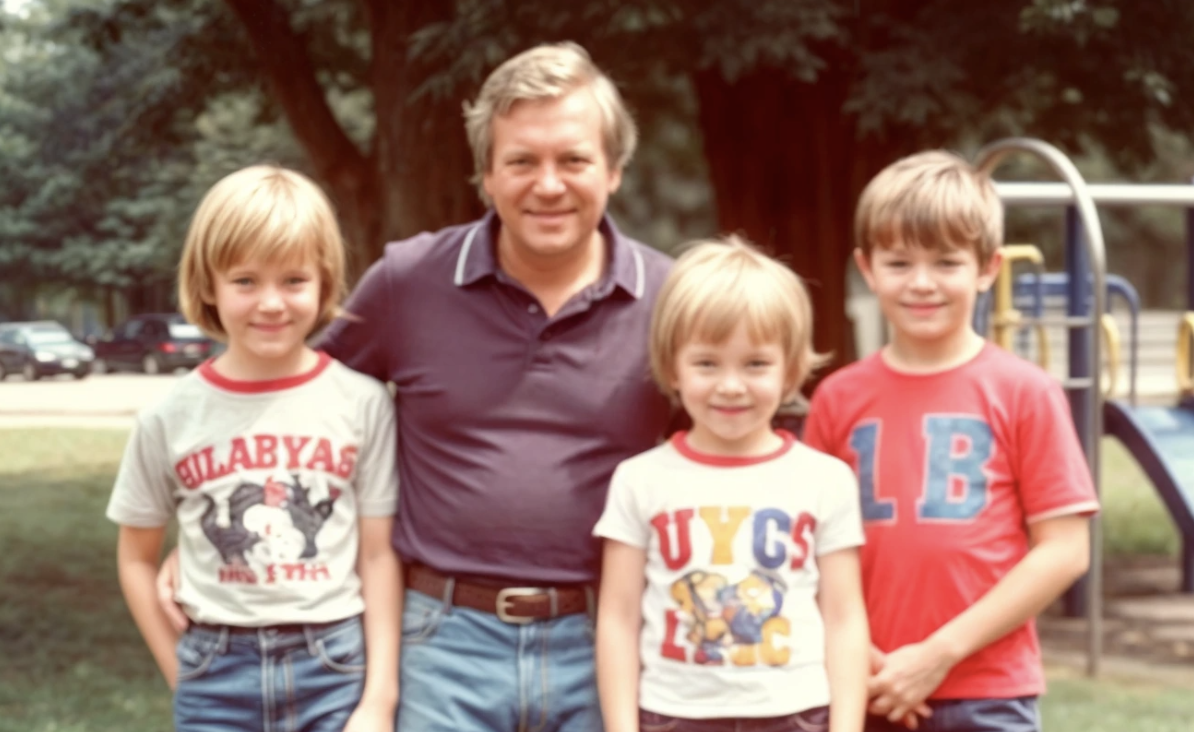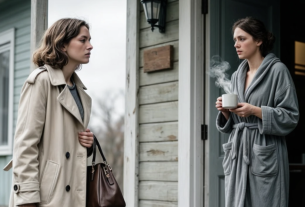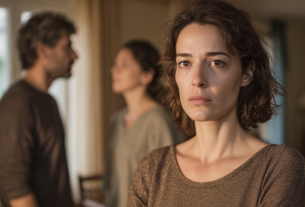In a quiet but harsh orphanage, hidden among gray brick walls and rare rays of sunlight, two boys were always called brothers. Andrey and Yura — not by blood, but by heart. From early childhood, from their very first steps and swaddling clothes, they were inseparable, like two halves of a whole. Their friendship needed no words — it showed in every glance, every gesture, every silent promise: “I’m with you. Always.” In a world where warmth was a luxury and affection a rare gift, they became a home for each other.
Their origins were tragic, like plays written by fate itself in dark tones. Yura’s parents died in a terrible tragedy — on the night when the house was filled with the smell of alcohol and laughter, they forgot about ventilation. And when neighbors smelled gas in the morning, it was already too late. Mother and father were gone, leaving the five-year-old boy with his grandmother, not knowing it would be the last time he would see them alive. And Andrey was born to a lonely woman who, looking at her reflection in the mirror, realized she could give her son neither stability nor a future. With a heavy heart but dignity, she made a decision — to give the child to the orphanage… and to leave life behind, leaving only a letter: “Forgive me, son. I could not be a mother to you. May you have a chance.”
Within the orphanage walls, these two boys became a support for each other. When caregivers shouted, when other children bullied them, when the cold winter nights seemed endless — they simply sat together, held hands, and were silent. Sometimes they dreamed. They dreamed of a home where it would be warm, of a mother who would stroke their heads, of a father who would teach them to drive. But most of all — they dreamed of never losing each other.
Once, in a moment of despair and a desire to escape reality, they did something for which they were almost expelled from the orphanage. Together, they ran away at night, sneaked into the market, and stole food — bread, cheese, a can of condensed milk. Not out of greed, but hunger. From a feeling that the world did not notice them. They were caught, but seeing their eyes — full of fear and pain — the administration forgave them. It was their only misstep, but it stayed in memory forever. However, the rumor reached higher authorities, and for some time the orphanage underwent an inspection. But even that did not separate the brothers.
There was another moment they remembered warmly. Every few months, a man would come to the orphanage — a sponsor, but not just a wealthy person handing out gifts. He was warm, sincere, with eyes full of kindness. He played with the children, listened to their dreams, laughed at their jokes. And once, he gave Andrey and Yura a pair of branded wristwatches each — not just accessories, but a symbol: “You are people. You matter.” These watches became sacred to them. They wore them even in the shower, even during sleep. They were not just watches — they were talismans, reminders that there was goodness in the world.
Years passed, and the boys grew up. Their teenage years brought first loves, first disappointments, first heartbreaks. Andrey and Yura fell for the same girls — their tastes were surprisingly similar: tall, with bright eyes, with smiles that could melt ice. But every time they gave way to each other. “You saw her first — take her,” said one. “No, she likes you more — go ahead,” replied the other. Their friendship was stronger than passion. Caregivers watched them worriedly: “Will they grow into real people? Will they be able to love? Will they be able to forgive?”
Then came the draft. The army. The medical commission checked their health, and both passed. But fate, as always, was cruel — they were sent to opposite ends of the country. Before parting, they hugged tightly, like brothers by blood. And standing at the gate of the military base, they exchanged watches — those very ones given by the sponsor. “Let each of us carry a part of the other,” said Yura. “Write to me. I’ll be waiting,” replied Andrey.
Andrey, having fallen in love with the sea, decided to stay in service aboard a ship. Waves, salty wind, stars overhead — all this became his new life. Yura returned to his hometown. First thing he did was go to the former orphanage. But their beloved caregiver Valery Mikhailovich was no longer there. Only an old cleaning lady said, “He retired. Here is the address.”
Yura found a five-story building and pressed the intercom. When the door opened, there stood a man already gray-haired but still kind. They hugged — like a father and son. The apartment smelled of mint tea and cookies. Valery Mikhailovich poured tea, smiled:
“Well, look at the man you’ve become! How’s life, son?”
“Kind of… empty,” Yura answered honestly.
“Listen, I have a friend who owns a car repair shop. You have strong hands, a smart head. I’ll talk to him — he’ll take you. The job has prospects. The salary is decent. Then a dorm room, and later, maybe an apartment. You’ll get married — you’ll have a family.”
Yura nodded. He didn’t hesitate. This was a chance. And he took it.
A few months later, a girl arrived at the shop in an old Lada. The car was choking like a tired person. Yura went out, looked at her — and his heart stopped. There stood Marina — tall, with thick chestnut hair, eyes shining with something genuine. He fixed the car, and she, smiling, left her number. The next day he asked her out. She agreed.
Their love grew like a spring flower — slowly but surely. After a couple of months, he proposed. On his knees, in the rain, by a fountain. She said: “Yes.” Loudly, laughing, crying, holding his hand tight.
Only close friends were invited to the wedding. Yura called Andrey:
“Will you come? I hardly have anyone from my side. I want you to meet my Marina.”
“Of course, brother. I’ll come. I swear.”
And he came. Brought gifts, tears, smiles. Marina immediately loved him — not only for his kindness but for how he looked at Yura. Like a brother. Like family.
A few months later, Marina began eating salty foods nonstop. Yura understood — she was pregnant. The test confirmed it. And the ultrasound showed — triplets. Three babies. Marina turned pale. “How will we manage? We barely get by for two…” Yura took her hand:
“Don’t be afraid. We’ll manage. We’ll raise them. We’ll help your mother. I’ll find a second job. A third if needed. No one will suffer.”
They dreamed — of a big house, a garden, children running on the lawn. But dreams shattered when in the eighth month Marina was hospitalized. Then — the birth. Then — three tiny angels. A photo came to Andrey. He cried. “Yura, you’re a father. You did it.”
But a month later — tragedy. Yura, working as a taxi driver, fell asleep at the wheel. Accident. Death. Marina heard the news — and collapsed. Collapsed as if the whole world had fallen apart.
Andrey flew in on the first flight. He organized the funeral, spoke with doctors, comforted Marina. She looked at him — and saw Yura. The same gaze, the same smile, the same hands. It hurt her. But he stayed. “I won’t leave. I promised.”
He quit the ship. Stayed with her. With the children. With the pain. With hope.
Over time — something new sparked between them. Not betrayal. Not infidelity. But love, grown from friendship, grief, shared pain. One day Marina said, “I’m tired.” He hugged her. And in that embrace, everything became clear.
When the children turned one, Kiryusha — the weakest of the three — began to choke. Diagnosis: congenital heart defect. Surgery — abroad. Cost — astronomical. They had no money. Andrey’s friends whispered: “Leave them. You’re young. Find a normal life!”
But he spent a sleepless night. Then wrote their story — about the orphanage, about Yura, about the triplets, about Kiryusha’s illness. Sent it to a volunteer organization. The next day — the first donation. Then the second. Then the third. Strangers helped. Within a month — the needed sum was raised.
The surgery was successful. Kiryusha survived. Grew up. Ran. Laughed.
Andrey realized: “I can help. I must help.” He became a volunteer. Organized a foundation. Gathered a team. Saved others.
And then — the wedding. Andrey and Marina. Tears, flowers, sunshine at the ceremony. Everyone said: “This is not just love. This is destiny.”
And now — another piece of news. Six months later Marina said: “We’re going to have another baby.” Andrey fell to his knees. Cried. “Four. We will raise four.”
They bought a three-story house. With a garden. With swings. Rooms for each child. And one common room — for memories. On the wall hang two old watches — those very orphanage watches. And next to them — a photo of Yura.
He was with them. Always.



